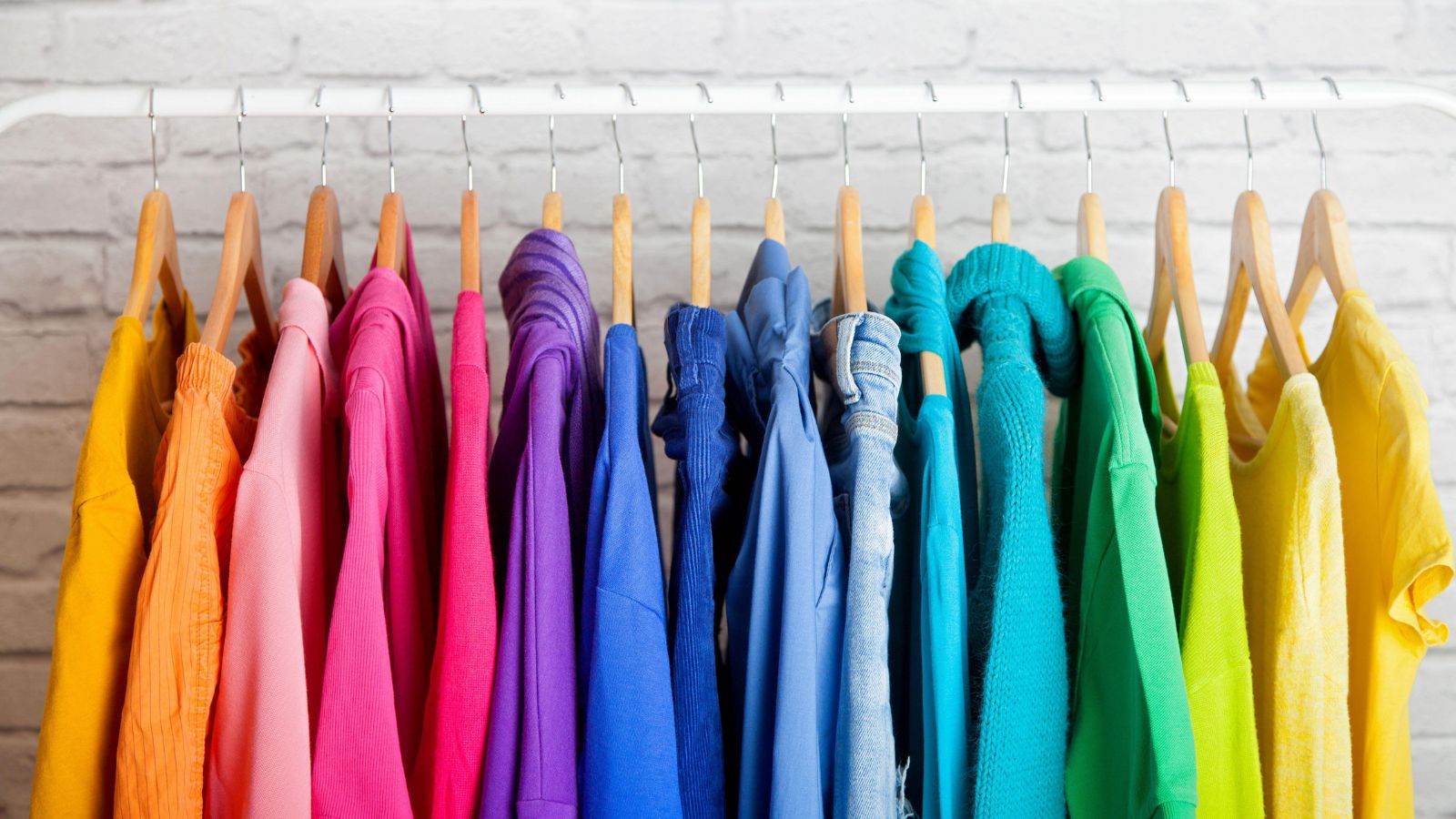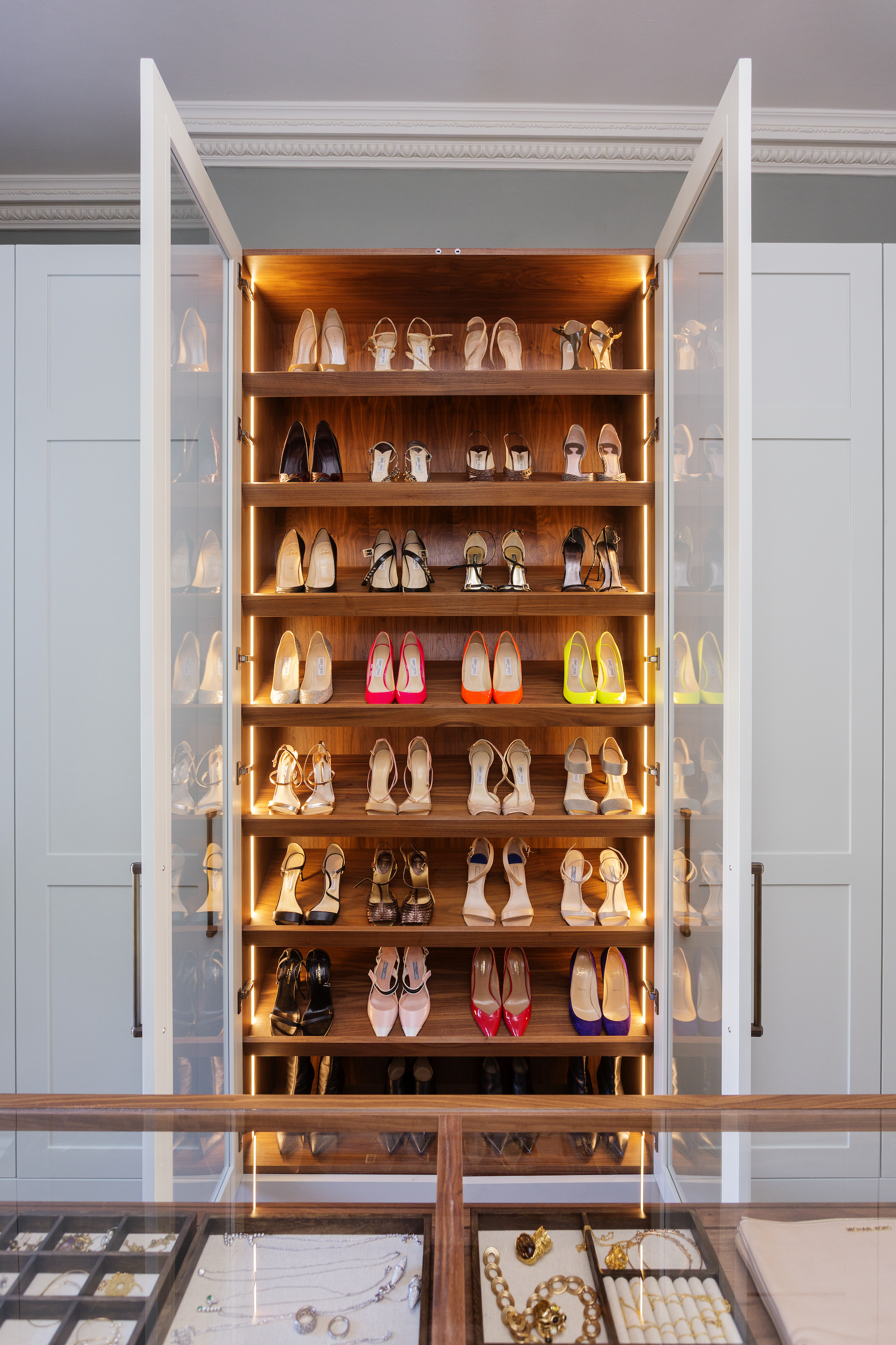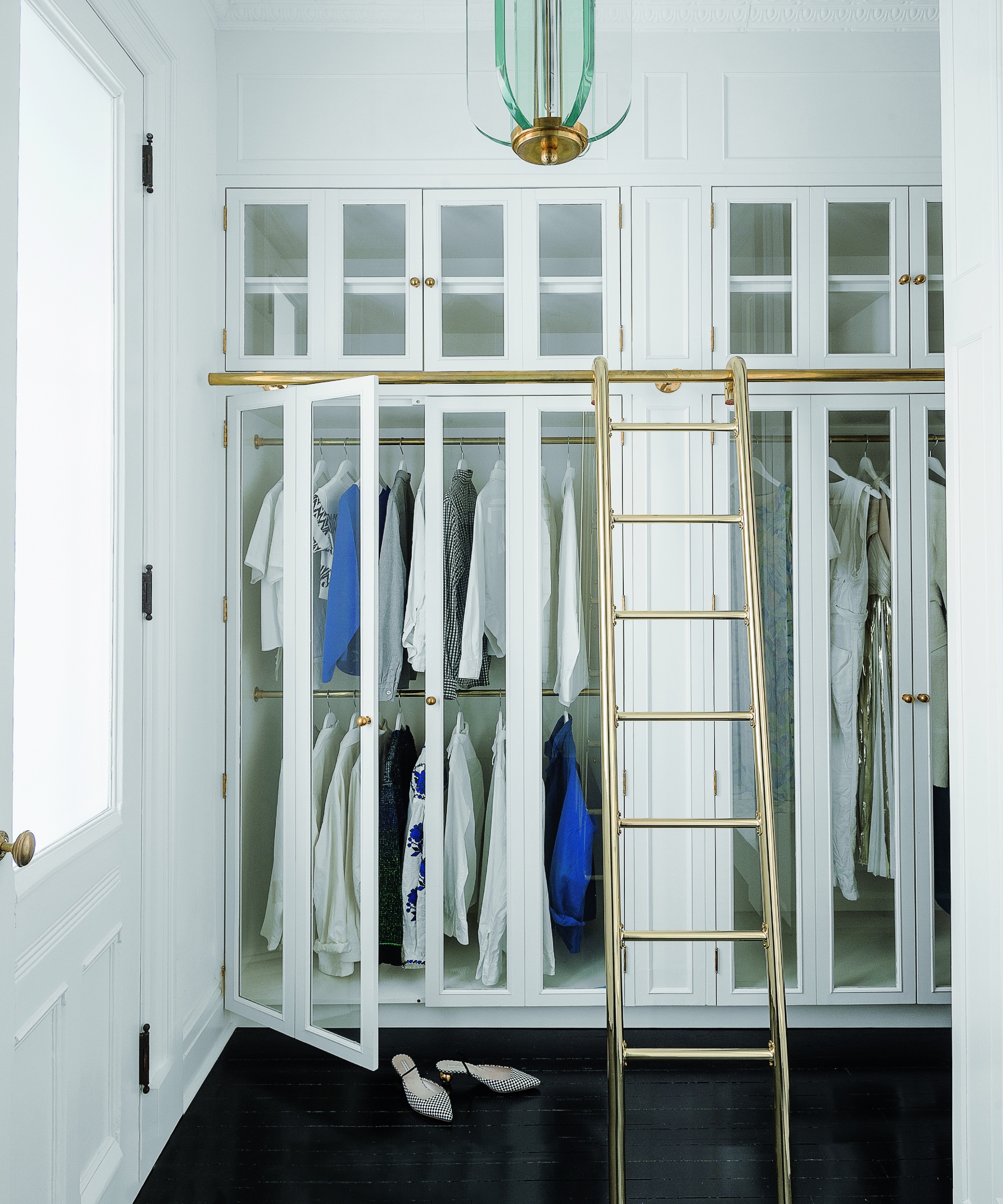
Sorting a closet by color is the perfect option if you want an aesthetically put-together wardrobe, and be able to find items quickly. But it can be trickier to keep organized than you might initially think.
I decided a few years back to give this form of closet organization a go after seeing all the pictures of Pinterest-perfect color categorization sweeping across my feed. However, keeping it pristine has not been an easy feat – especially when my closet started to gain more neutral pieces than bright colors.
However, with a few expert tips, I have managed to maintain a color-organized closet to keep the space pretty, functional, and easy to navigate. This is how.
How to maintain a color-organized closet
If, like me, you thought that color-organized closet storage wouldn’t be too difficult to master (you are just putting green with green and blue with blue and so on, after all) then you may be shocked at how tricky it is to strike the balance between practical and pretty. Once I worked out a system, however, I found that it made putting an outfit together in the morning much quicker.
1. Keep clothes grouped by type as well as color

My first big mistake when I started color organizing my clothes was grouping garments by color, and neglecting to group them by category. As a result, I would be flipping through my entire collection of black clothing before I could find the t-shirt I wanted.
I quickly learned that I should organize clothes in two ways, breaking down my collection into color groups, and then lining them up on the rail with all the pants together, then the skirts, then the tops, and so on. When setting the closet out for the first time, I tried to keep this category order for all of the colors to make the system more streamlined.
2. Follow the rainbow to set up your categories
There are plenty of different ways you can set out your color coordinated closet, whether you move from light to dark or block your colors with no rhyme or reason, but I found that using the rainbow was the easiest way to sort my clothes storage ideas without having to think too hard about the order.
I started with reds and worked my way through ROYGBIV, and, as a right-handed person, keep my blacks, whites, and neutrals at the right side of my closet as these were the pieces I reach for the most.
3. Break neutral colors down into tones

It is a common misconception that organizing a closet by color is only good for those of us that wear every color under the sun. As someone whose wardrobe has become largely based around browns, creams, beiges, and blacks with color used as an accent, I still found color-organizing useful.
I started with the obvious shades, grouping blacks and then browns together, working from dark to light, and then started to categorize beiges and creams, again working from dark to light and paying attention to the undertones. I put warm-toned neutrals together and then cooler tones together to help when assembling an outfit and putting tops and jackets together.
This took me a while to get used to when I first started, but now I instantly recognize the undertones of any garment and know exactly where to put it back in my closet.
4. Opt for neutral hangers to reduce visual clutter
I have worked with enough professional organizers to understand which closet organizers are best and which should be avoided. One item that is recommended repeatedly is a set of neutral velvet slimline hangers. I was skeptical about whether the investment was worth it at first, but the thin (yet sturdy) organizers are perfect for allowing the colors in your closet to sing without adding to any visual clutter.
The hangers keep my clothes in place while disappearing into the background. Your clothes should be the focus of your closet after all – not the hangers.
Wooden clothes hangers could have the same effect for this, but are a little bulkier so may not work in small closets or if you are in need of some space-saving closet techniques.
5. Color coordinate shoes and accessories, too

Although I first started color organizing my closet for the aesthetics, I learned early on that it has to be functional and make it easier for me to put an outfit together to help maintain it. At first, I had neglected to color organize my shoes and accessories such as belts, scarves, and bags. As a result, finishing off an outfit was just as awkward as it was before I color-coded my clothing.
Again, most of my shoes were neutrals, so I found that using a shoe rack and lining them up from light to dark worked best for me but someone with a larger, more colorful collection may be able to use shoe bins, such as these from The Container Store, to stack them in rainbow order.
Bins were also the perfect solution for my accessories. I don't have too many independent pieces – just a few staples I return to again and again, so I used a colored box and lumped all the different pieces of the same color together. I picked up a brown bin to keep my brown belts, scarves, and tote bags together and did the same with a black bin, and a cream bin.
If you have more space or are able to commission bespoke joinery, then an accessories drawer could be great for this, allowing you to lay everything out in color order on display, or using clean bins to group colors and categories together – depending on the size of your collection.
6. Keep formal and casual clothes separate
One organizing tip I implemented from the beginning was to keep my formal clothing and my casual clothing separate. I am far less likely to wear my formal dresses, so lumping them in with my everyday clothing just because they were the same color didn't make much sense. I had the luxury of two closets in which to organize everyday clothing in a rainbow and formal wear in color order in another, however, it is simple enough to split a single closet in two and have two groups of rainbow-colored clothing beside one another.
7. Place patterns based on their dominant color, or between color categories

Home organization is always complicated by pieces that do not quite fit the mold. When it comes to color organizing a closet, multi-colored patterned pieces used to throw a spanner in my works. The simple way around it is to place the patterned piece based on its dominant color. A black dress with floral motifs goes with the black clothing, for instance.
Another approach I considered was to rearrange the color order so that clothing with two colors would sit between those two categories. A blue and green dress would then be on the boundary of the all-blue and all-green clothing. I think this is a good approach if you only have a few multi-colored pieces, or don't mind having a few slightly out of place.
FAQs
Is it better to organize a closet by color?
While it is down to personal preference, organizing a closet by color is great if you want to make putting a coherent outfit together a little easier. Breaking down clothes this way allows you to quickly locate colors that go well together without having to dig through your categories, and could even help you to match color combinations you hadn't previously considered. What’s more, color-coding clothing is satisfying to the eye, meaning it is a little more motivating to keep neat and tidy – especially if you are a visual person.
What is the best color order for a closet?
Typically, working in rainbow order (ROYGBIV) is the most common way of color organizing a closet as it helps you to create categories without much thought. That being said, ordering your categories from light to dark is also a common approach. This is another incredibly aesthetic option, although this may not create as much visual contrast to help you distinguish categories at a quick glance.
Maintaining a color-organized closet is a great way to organize a closet without buying anything, using your existing garments to set out defined zones in your storage without the need for dividers. The best approach is to be open to altering your categories a little and shifting color sections around to make it functional for you and what you wear most.







